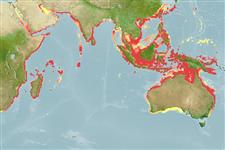Elasmobranchii (tubarões e raias) (sharks and rays) >
Rhinopristiformes (Shovelnose rays) >
Pristidae (Sawfishes)
Etymology: Pristis: Greek, pristis = saw (Ref. 45335).
More on author: Bleeker.
Environment: milieu / climate zone / depth range / distribution range
Ecologia
marinhas; Água doce; estuarina demersal; intervalo de profundidade 5 - 70 m (Ref. 114953). Tropical; 30°N - 37°S, 20°E - 155°E (Ref. 114953)
Indo-West Pacific: Persian Gulf (Ref. 68964), Red Sea and east to South Africa, western India Sri Lanka, Laos to Papua New Guinea, south to New South Wales, western to eastern Australia (Ref. 114953).
Comprimento de primeira maturação / Tamanho / Peso / Idade
Maturity: Lm ?, range 430 - ? cm
Max length : 730 cm TL macho/indeterminado; (Ref. 5578); common length : 550 cm TL macho/indeterminado; (Ref. 11228)
Dark grey to blackish brown above, white to yellowish below (Ref. 11228).
Demersal on both insular and continental shelves, but now thought to be extinct through much if its original range (Ref. 114953). Inshore and intertidal species known to enter freshwater in some areas (Ref. 9859). Found in shallow bays, estuaries, and lagoons (Ref. 11228). Often on the bottom with its saw elevated at an angle to the body axis (Ref. 9859). Feeds on fishes and shellfishes (Ref. 58784). Ovoviviparous (Ref. 50449). Reaches maturity after 9 years. Females have litters of approximately 12 pups. Maturity size unclear, possibly near 430 cm TL; born at approximately 80 cm TL (Ref. 114953). Flesh considered tasty (Ref. 11228).
Ciclo de vida ou comportamento de acasalamento
Maturities | Reprodução | Spawnings | Egg(s) | Fecundities | Larvas
Ovoviviparous, embryos feed solely on yolk (Ref. 50449).
Compagno, L.J.V. and P.R. Last, 1999. Pristidae. Sawfishes. p. 1410-1417. In K.E. Carpenter and V. Niem (eds.) FAO identification guide for fishery purposes. The Living Marine Resources of the Western Central Pacific. FAO, Rome. (Ref. 9859)
Status na Lista Vermelha da UICN (Ref. 130435)
Ameaça para os humanos
Traumatogenic (Ref. 9859)
Uso pelos humanos
Pescarias: espécies comerciais; peixe esportivo: sim
Ferramentas
Relatórios especiais
Baixar XML
Fontes da internet
Estimates based on models
Preferred temperature (Ref.
123201): 24.6 - 29.3, mean 28.5 °C (based on 2833 cells).
Índice de diversidade filogenética (Ref.
82804): PD
50 = 0.5234 [Uniqueness, from 0.5 = low to 2.0 = high].
Bayesian length-weight: a=0.00501 (0.00198 - 0.01270), b=3.05 (2.83 - 3.27), in cm total length, based on LWR estimates for this (Sub)family-body shape (Ref.
93245).
Nível Trófico (Ref.
69278): 4.0 ±0.6 se; based on size and trophs of closest relatives
Resiliência (Ref.
120179): Baixo, tempo mínimo de duplicação da população 4,5 - 14 anos (Fec assumed to be <100).
Fishing Vulnerability (Ref.
59153): Very high vulnerability (90 of 100).
Nutrients (Ref.
124155): Calcium = 12.4 [3.1, 55.8] mg/100g; Iron = 0.505 [0.120, 1.454] mg/100g; Protein = 19.3 [17.2, 21.4] %; Omega3 = 0.11 [0.04, 0.28] g/100g; Selenium = 81.8 [22.3, 265.0] μg/100g; VitaminA = 3.88 [1.41, 10.36] μg/100g; Zinc = 0.61 [0.29, 1.12] mg/100g (wet weight);
